Erica Vetsch's Blog, page 110
July 1, 2019
Hiding in Plain Sight: What My Characters Taught Me with guest Tara Johnson
“Man has gone out to explore other worlds and other civilizations without having explored his own labyrinth of dark passages and secret chambers, and without finding what lies behind doorways that he himself has sealed.”―Stanisław Lem

“Tara, do you know what you are?”
My friend sipped her coffee and leveled me with a kind but far too direct stare. The kind of stare that is only earned through truth and years of hard-won trust.
“What?”
“You’re a rodeo clown.”
I blinked, unable to formulate a reply in the sting of her assessment. I didn’t relish being compared to a clown. All I could see were the floppy shoes and bright-red nose. I contemplated dumping the coffee in her lap when she smiled.
“I don’t mean like Bozo the clown. I mean you stand in front of the crowd doing tricks, telling jokes, making everyone laugh. You see to their happiness while plastering yourself in makeup to give the illusion of a whimsical clown. But sometimes you hide behind that painted smile.”
 She was all too correct. It’s easier than some might think to hide in plain sight.
She was all too correct. It’s easier than some might think to hide in plain sight.I grew up as a preacher’s kid. I saw the good, the bad, and the ugly in churches. Somewhere along the way, I fell for the lie that approval and love are the same thing, but I was wrong. They are polar opposites.
Approval is a stamp that says, “You meet my expectations.” It drips of condescension and conditions. Love says, “You’re a mess, but I’m crazy about you anyway.” For too long, I lived as a people pleaser, looking for unconditional love in conditionally-minded people. I failed. Over and over again.
Thankfully I grew older and wiser. God brought amazing people—teachers, doctors, and friends—who helped unearth the wounds I kept locked away in the shadowed places of my heart. For a while I thought I had it all figured out . . . until I started writing. That’s when my characters began to teach me things I’m often afraid to confront.
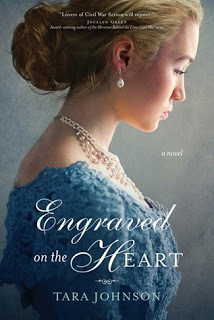 In my debut novel, Engraved on the Heart, my heroine Keziah battles epilepsy while working as a conductor in the Underground Railroad. She struggles against the expectations of her staunch Confederate family, hiding her frailties from society’s critical eyes and pleasing the brother she adores while still trying to remain true to her own convictions. As Keziah’s story unfolded, I realized I fell for the same lie she had . . . that broken means worthless.
In my debut novel, Engraved on the Heart, my heroine Keziah battles epilepsy while working as a conductor in the Underground Railroad. She struggles against the expectations of her staunch Confederate family, hiding her frailties from society’s critical eyes and pleasing the brother she adores while still trying to remain true to her own convictions. As Keziah’s story unfolded, I realized I fell for the same lie she had . . . that broken means worthless.In my latest novel, Where Dandelions Bloom, Cassie Kendrick escapes her abusive father by enlisting as a male soldier in the Union Army. Cassie hides in plain sight yet fools herself into thinking she is finally liberated from the torment that has shadowed her life. In her quest for freedom, she comes to realize the only thing keeping her captive is her refusal to forgive her father.
While penning these two novels, I came to understand two things. First, I discovered Cassie and Keziah are reflections of my own secrets, the wounds I’ve tried to mask behind grease paint and wide smiles. Second, I realized why I write. Writing to win over the masses or for my own personal ego is a broken cistern of despair, nor do I write to escape. Instead, I start each book with a question I don’t know the answer to and ask God to reveal the answer as the story unfolds. To reveal himself.
 In other words, I write to know God.
In other words, I write to know God.Many writers think their main goal should be voyaging off un-pubbed island. A noble goal, as long we don’t forget why we write. Published or unpublished, they both have their place and can teach us beautiful things at our particular point along the journey. Be careful not to base your identity in being a published author or as a writer at all. The more you build your identity on something other than Christ, the greater the pain if that identity crumbles.
“The seeker embarks on a journey to find what he wants and discovers, along the way, what he needs.”―Wally Lamb
Know why you write. The motivation makes a difference.
And if, like me, you discover you’ve been hiding behind face paint and false identities, that’s okay. Write about that too.
Why do you write? What unexpected discoveries have you learned about yourself or about God as you’ve delved into the world of story? Do you believe courage is a requirement for being a writer?
Join the conversation in the comments! Thanks to Tara Johnson and Tyndale, one commenter (US only) will win a copy of Where Dandelions Bloom OR Engraved on the Heart!
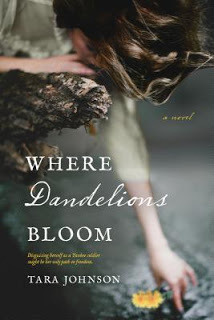 Cassie Kendrick is on the run. Her abusive father arranged her marriage to a despicable man, but she's discovered an escape. Disguised as a man, Cassie enlists in the Union army, taking the name Thomas Turner. On the battlefields of the Civil War, keeping her identity a secret is only the beginning of her problems, especially after she meets Gabriel Avery, a handsome young photographer.
Cassie Kendrick is on the run. Her abusive father arranged her marriage to a despicable man, but she's discovered an escape. Disguised as a man, Cassie enlists in the Union army, taking the name Thomas Turner. On the battlefields of the Civil War, keeping her identity a secret is only the beginning of her problems, especially after she meets Gabriel Avery, a handsome young photographer.Anxious to make his mark on the world and to erase the darkness and guilt lurking from his past, Gabriel works with renowned photographer Matthew Brady to capture images from the front lines of the war. As Gabriel forges friendships with many of the men he encounters, he wonders what the courageous, unpredictable Thomas Turner is hiding.
Battling betrayal, their own personal demons, and a country torn apart by war, can Cassie and Gabriel learn to forgive themselves and trust their futures to the God who births hope and healing in the darkest places?
Where Dandelions Bloom... Available now!
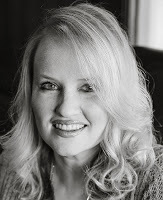 Tara Johnson is an author, speaker, and passionate lover of stories. She loves to travel to churches, ladies’ retreats, and prisons to share how God led her into freedom after spending years living shackled as a people-pleasing preacher’s kid.
Tara Johnson is an author, speaker, and passionate lover of stories. She loves to travel to churches, ladies’ retreats, and prisons to share how God led her into freedom after spending years living shackled as a people-pleasing preacher’s kid.From the time she was young and watched Gone with the Wind with her mother for the first time, the Civil War has intrigued her. That fascination grew into all aspects of American history and the brave people and stories who make up its vibrant past.
She says, “History is crammed full of larger-than-life characters. Doc Holliday, Annie Oakley, Helen Keller, Daniel Boone, George Washington, Amelia Earhart, and Frederick Douglass are just a few examples of flawed, wounded humans who battled their demons with determination and left an indelible mark on the pages of history. I suppose that’s why people are so fascinating. No matter the era, we all battle the same wounds. Abandonment, abusive fathers, overprotective mothers, loss, grief, rejection, addiction, crippling anxiety, loneliness, or the yearning for unconditional love, to name a few. We all battle the same junk and have to decide whether to fight or cave. Run or stand. Cry or smile. That’s what great characters do. They are a reflection of our struggles, our own wounds. Our own need. And, when written well, they remind us whom we need to turn to for healing.”
Tara has written articles for Plain Truth magazine and has been a featured guest on Voice of Truth Radio and Enduring Word Radio. Tara is a member of American Christian Fiction Writers. She and her husband, Todd, live in Arkansas, and the Lord has blessed them with five children: Bethany, Callie, and Nate, as well as Taylor Lynn and Morgan Lane, who are with Jesus.
Visit her website at www.TaraJohnsonStories.com and connect with her on Facebook and Twitter.
Published on July 01, 2019 21:00
June 30, 2019
Plowing through a rough field

Plowing through a rough field
A rural analogy applied to writing!As a rural woman, I felt pretty cool when that came to me!Here is your friendly neighborhood troubled loner/madwoman, reporting in.
I just had One of THOSE scenes to write.
One I knew was HARD to get right. One I knew was going to be a LOT of work, a lot of rewriting.
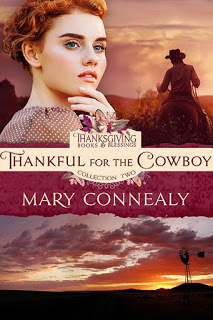 Novella coming in September
Thanksgiving Books and Blessings CollectionUsually this happens to me when I’m coming up against an action scene. They are just difficult to get right. Tons of motion. Tons of FEELINGS. And you have to write a whole lot in such a way it doesn’t stop the action, with my tendency toward humor and asides and snarky dialogue…mostly NONE of that is appropriate in an action scene.
Novella coming in September
Thanksgiving Books and Blessings CollectionUsually this happens to me when I’m coming up against an action scene. They are just difficult to get right. Tons of motion. Tons of FEELINGS. And you have to write a whole lot in such a way it doesn’t stop the action, with my tendency toward humor and asides and snarky dialogue…mostly NONE of that is appropriate in an action scene.Well, I had such a scene but this was a little different. I wanted it to be a powerful FAITH scene rather than action scene.
There is Christian faith running through all my books. And I’m opposed to like…preaching sermons. But I had a character, a STUBBORN character who is frightened of her own shadow. A character with a very strange, confused notion of her faith. She thinks there are two Bibles. And she's afraid all the heretics who don't know about the second one can never make it to heaven. So she feels compelled to SAVE THEM at the same time all her instincts are to be a crazed recluse. Yeah, she's a fun character.
I needed to solve that. I wanted to actually HIT it hard. Bring her around.
Do it, or at least kick her down the right path, in a single scene I’d been building up to. (I'd been nudging her but it was TIME to iron this out)
And in true Mary fashion, I was ducking it.
I know I do this. I KNOW! I KNOW!!!!

But it’s weird. It’s subconscious. I have to recognize what I’m doing. Instead, I go back, rewrite scenes, revise, fiddle, brainstorm what happens at the end (I brainstorm alone! I lay (lie?) awake nights tossing ideas around like a juggler. I even have that visual in my head, juggling ideas. It’s fun.
But it took me awhile to recognize I was dodging this scene. As a matter of fact I’d written on past this scene, I was so intent of not taking the time, bleeding out the words, to get it right.
I finally noticed my avoidance and grimly faced that scene. I KNOW I CAN’T DO IT RIGHT THE FIRST TIME!

So I dug in. I wrote it BADLY. It was too short, too unemotional, too preachy and, worst of all, I still ducked the LESSON I wanted my heroine to learn. I CAN BE SUCH A JERK.
But at least it was done. Now I rewrite. Then I write on, then force myself to go back.
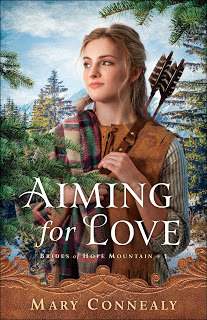 Coming in October--Pre-order NOWIt’s still not right after about FIVE passes. But five more…then maybe.
Coming in October--Pre-order NOWIt’s still not right after about FIVE passes. But five more…then maybe.So my advice today is to RECOGNIZE when you’re stopped, when you're (as Cate Nolen said last Wednesday) Procrastinating…it MIGHT BE, because you don’t want to tackle a HARD scene.
Get in there. Get it down. Then fix it.
Usually it grows and grows, then you cut, then you add. Remember the EMOTION in the scene. If it’s hard for ME then it’s hard for the characters and you need to see the gaping wounds of feeling pouring through the scene.
Writing all this makes me realize I need to go back. Revise AGAIN!!!
It’s not there, but at least if you get it down wrong, you can fix it. You can’t fix a blank page.
Does anyone else do this? Or, as most writers feel, am I completely alone!?
Published on June 30, 2019 21:00
June 28, 2019
Weekend Edition

If you are not familiar with our giveaway rules, take a minute to read them here. It keeps us all happy! All winners should send their name, address, and phone number to claim prizes. Note our new email address and please send your emails to Seekerville2@gmail.com

Monday: Erica Vetsch was our hostess, chatting about how every spiritual journey starts with a lie!
Wednesday: Welcome Cate Nolan as our newest Seeker! Cate shared how procrastination can kill dreams. But in that death, she also offered hope. Great stuff here!!
Friday: Pam Hillman

Monday: Mary Connealy Join Mary while she talks about Plowing through a rough field!
Tuesday: Tara Johnson shares her own personal experience battling identity and acclaim/recognition.
Wednesday: Mindy Obenhaus will be here to discuss being a flexible writer in Roll with the Changes. Friday: Jane Choate

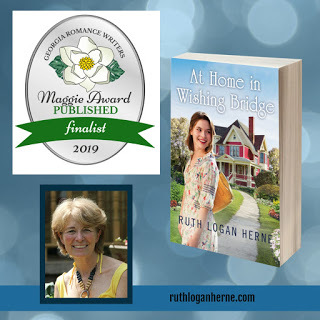 Congratulations to Ruthy! She was named a Maggie Award of Excellence finalist this week for her 2018 release "At Home in Wishing Bridge" from Waterfall Publishing Company, a division of Amazon. The winner will be announced at Moonlight & Magnolia Conference in October and Ruthy wants to congratulate the other wonderful finalists: Laurel Blount, Kristi Hunter, Kelly Goshorn and Rachel Dylan. What an honor to be in such wonderful company!
"At Home in Wishing Bridge" available here!
Congratulations to Ruthy! She was named a Maggie Award of Excellence finalist this week for her 2018 release "At Home in Wishing Bridge" from Waterfall Publishing Company, a division of Amazon. The winner will be announced at Moonlight & Magnolia Conference in October and Ruthy wants to congratulate the other wonderful finalists: Laurel Blount, Kristi Hunter, Kelly Goshorn and Rachel Dylan. What an honor to be in such wonderful company!
"At Home in Wishing Bridge" available here!

Thankful for the Cowboy (Thanksgiving Books & Blessings Book 3) Novella--Preorder now, releasing in September. Get the whole collection!
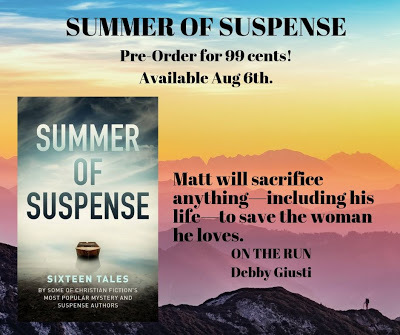 SUMMER OF SUSPENSE features 16 stories by your favorite Christian Authors. Pre-order now for only 99 cents!!!
SUMMER OF SUSPENSE features 16 stories by your favorite Christian Authors. Pre-order now for only 99 cents!!!Nook https://bit.ly/2DZC0YQ
Apple https://apple.co/2VcpYkA
Amazon https://amzn.to/2VsrPqsAvailable Aug 6th. Post-release price: $9.99.
Here’s a sneak peek at Debby Giusti's story, ON THE RUN…When Annalise Bonner reports a murder at Lakeside Lab’s guarded compound, security wants her silenced. Her only hope is Matt Mayor, the man she loved and left because of a covert military assignment. Can she trust Matt not only with her life but also her heart?
Knowing she’s in danger, Matt secrets Anna away from the remote Tennessee research enclave to the Amish community of Ethridge and on to the North Georgia Mountains as a multistate manhunt mounts. Running out of options to keep Anna safe, Matt will sacrifice anything—including his life—to save the woman he loves.

Identify Your Characters' Emotional Triggers by Lisa Hall-Wilson
4 Ways To Write Gripping Internal Narrative by K.M. Weiland at Helping Writers Become Authors
The Writer's Practice: Your Everyday Writing Warm-Up by Anuradha Prasad at Live Write Thrive
APODS - Organization by Amanda Cabot at Thyme For Writers
How To Survive A Writing Crisis by Tasha Seegmiller at Writers In The Storm
Published on June 28, 2019 21:00
June 27, 2019
Instant in Season, and Out of Season
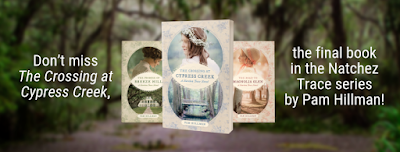
by Pam Hillman
Well, here I am again, burning the candle at both ends.
Y'all are getting the rough and ready version of this week's blog post. But I kind of have a feeling that 99% of you will be nodding your heads that you totally get where I'm coming from.
As I type this directly into blogger an hour before it's due, I'm reminded of the time years ago that the Seekers all met at Tina Radcliffe's house. While there, Camy Tang logged in to the Seeker blog, typed her post practically live and added photos right there on the spot. I was amazed and not a little bit in awe! I couldn't imagine having enough confidence in what I had to say to do that.
Yet, here I am, doing it! Granted, it took me TEN years to get to that point.
2 Timothy 4:2 tells preachers to be instant in season and out of season. Growing up, in the church services I attended, that meant that if a preacher attended a church service and was asked unexpectedly to deliver the message, he'd better have one ready. I've never heard a preacher get up without delivering a rousing sermon. I'm not a preacher, but I do need to be instant in season and out of season. But of late, it seems like I've been out of season more than in. Not necessarily here in Seekerville, but in life in general. You know, just having so many irons in the fire that you find it difficult to figure out which one needs your attention next.
So, today I wanted to share with you a bit about the last week of my life. My 3 year-old granddaughter had a tonsillectomy eight days ago. She's doing great, and we're very, very thankful for that. However, it was decided that she shouldn't go to the sitter's this week, so I ended up babysitting her and her 9 month-old sister five full days instead of three. Of course I love keeping my grands, but extra days of loving on grandbabies puts a damper on other jobs that need to be done, you know?
I had one job... well, three ... that I absolutely had to get done this week. Babysit every day, meet my exercise goals, and write a blog post for Seekerville. I'm closing in on batting 100%.
You know what I discovered?
I'm here to tell you that every blog post doesn't have to have three points, five or even ten. Maybe we don't always have to share some new revelation about the craft of writing, or the latest time-saving technique. Sometimes it's good to just be open and honest and show the ratty bathrobe and unwashed hair. (I'm sure it didn't escape your notice that I didn't ACTUALLY post a photo of such. I DO still have some pride, after all!)
Sometimes we just need to be reminded that we're all busy, we all have crazy lives, we're all scrambling to DO life, which includes this writing gig that we love.
I used to wonder if I was the only person who often felt like a hamster perpetually on a wheel, but the more I open up to others, the more I realize that the majority of my friends are just as busy as I am. Anyone who has it all together and is always as cool as a cucumber, please speak up. We want to schedule you in Seekerville so you can share your secret! :)
As I said, this has been raw, but I hope it speaks to someone going in to the weekend. When it seems like you're being buried alive with tasks whether of your own making, or unexpectedly from your employer, your family, just keep moving forward. Keep doing. Keep crossing things off your list. I chose not to stress today's post, and instead, I want you to know that I'm just like you. I don't always have it all together, but I regroup, ramp up the hamster wheel and have another go at it.
Hey, check out one of the videos I made from my impromptu photo shoot on The Natchez Trace last week. Another instance of being instant out of season as I found myself close to the Natchez Trace, I had books with me, and I decided to take advantage of the situation on the spur of the moment.
Published on June 27, 2019 21:30
June 25, 2019
A 15 Letter Word NOT Equal to Lazy
If you visited Seekerville a few weeks ago, you might have read Missy graciously reposting a piece I did as a guest on Seekerville several years ago. Writers Write
I liked that post. I felt like it was a good introduction. But as I prepared to write my first regular column, I was plagued by a favorite writer’s question – What if?
What if writers don’t write?
The obvious answer to that is, if writers don’t write, then technically they’re not writers.But…
What if… you’re still making up stories in your head, but not getting that time in front of the keyboard (or in a notebook) to get them down. Again, the obvious answer – technically, you’re not a writer (though in this case you could still claim to be a storyteller).
So, if you’re a writer, if you want to be a writer, why aren’t you writing?
There can be many reasons, some valid, some mere excuses. I should know. I’m a pro with both.
In the interest of fair disclosure, I decided to write about this problem today because I know it inside out and back again. Those valid and invalid reasons? I know them too.
Some of you know that my husband passed away after a brief (3 month) battle with cancer. I had a novella due for a collection right after his death. Somehow, by grace and the blessings of numbness, I finished the story on time. What few people know was that his death came on top of a 2 -3 year very difficult period, and it all began just as I sold my first book to Love Inspired Suspense.
I don’t say this to make excuses for myself. Lots of people write through illness (their own and that of family members or friends). I assume if writing was my job, I would have also. But I have a full time job as a teacher and a part time job as a tutor. There was just not enough mental energy to deal with everything, so writing fell by the wayside.
My sum total of writing during that period was edits on my LIS, 3 novellas, and lots (and lots and lots) of pages written on future books – but none of them completed.
Not really satisfactory for someone who claims to be a writer.
There’s a nasty word for it and it’s way more than 4 letters.
The word is -
P-R-O-C-R-A-S-T-I-N-A-T-I-O-N
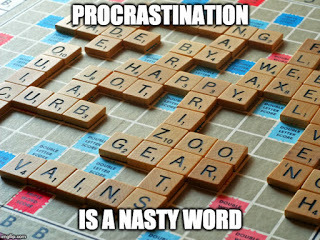
So yes, my first regular Seekerville post is about PROCRASTINATION.
My name is Cate and I am a procrastinator.
Can any of you relate?
According to my research, I’m far from alone.
I decided to do this post about procrastination after I read an interesting article online. According to the article (I’ll link it below), we are not procrastinators because we are lazy.
Did you read that correctly? NOT lazy.
That article sang to me because who wants to be called lazy (even by themselves)?
But you know how when something seems too good to be true, you can be a little suspicious?
I was suspicious about this not lazy thing. Because honestly, when I know I’ve been procrastinating, I feel lazy.
But there was something niggling in my brain. I’d had a conversation with my boss recently about how we were both terrible procrastinators because we had to be feeling the pressure of a deadline to be able to produce anything.
True story: I had to make a 45 minute presentation at an educational workshop last Friday. On Wednesday, he asked me how I was doing with it. I replied. “I’m fine. I haven’t started it yet.” He laughed because he totally understood.Before you pick your jaw up off the floor (or nod your head in understanding), let me say that I had been THINKING about it. I knew what I wanted to say and I knew which photos and videos I wanted to use. I just hadn’t begun to physically put it all together. Why?
My brain doesn’t work that way.
That may sound like an excuse, but it really isn’t. I have tried for years to be one of those people who does things in advance. I WANT to be one of those virtuous people. It would be ever so much better for my health.
BUT. I. JUST. CAN’T.
I have tried. I've begun working on things early, but I come up blank. Deadlines clear my brain and allow me to finally focus.
True story: When I was doing my final edits for Christmas in Hiding, I was stuck. I had known from Day 1 that my editor didn’t love my opening. No matter what I tried to do, I couldn’t come up with a better one.
All my other revisions were due and the deadline was looming. So I sat down and wrote it. And just like that, the pieces fell into place.
The lesson you pick up along the way is that if you wait long enough, it will all work out.
It's an easy lesson, but there is a big problem inherent in this method.
NO DEADLINE = NO PROGRESS
And that's why I wanted to blog about this. I'm tired of the "no progress."
So let's get to the research.
"Essentially, procrastination is the avoidance of work or necessary tasks by focusing on more satisfying activities. It’s easy to chalk procrastination up to a lack of self-motivation, lazy habits or incompetence. But in reality, procrastination is chemical; there’s a science to why we prefer relaxing activities to the required. Procrastination boils down to a battle between the limbic system and the prefrontal cortex."(https://share.upmc.com/2015/07/the-sc...)
Okay, so then why do some people never procrastinate, and some of us do on everything?
The original article that I mentioned has this quote from Fuschia Sirois, professor of psychology at the University of Sheffield:
"...we say that procrastination is essentially irrational," And, she reveals, "people engage in this irrational cycle of chronic procrastination because of an inability to manage negative moods around a task."
According to Sirois and Tim Pychyl of Ottawa's Carleton University, you might understandably think overcoming procrastination is first concerned with task completion, in reality it's primarily concerned with "the immediate urgency of managing negative moods."
Suddenly, I'm preferring lazy.
Published on June 25, 2019 21:00
June 23, 2019
It Starts With A LIE!

Slipping in a personal confession here: The Spiritual Journey of a character is one of the most difficult aspects of writing Christian Fiction for me.
In examining why I struggle, I’ve determined it’s because every spiritual journey starts with a lie . Either believing something that isn’t true, or not believing the truth because it isn’t known yet. As the author, I KNOW it’s a lie. I’ve either already been taught the truth, or learned it through experience. The temptation is just to tell my character to stop believing lies and get on with their lives...
And yet, my characters need a spiritual journey, something that they either didn’t know about God when the story started, or something they thought they knew, but that turned out to be untrue.
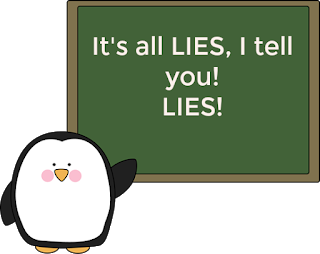
The Spiritual Journey is the bedrock of the story, so I need to know and understand it fairly early in the plotting process. Once I realized this, plotting that spiritual journey got easier...not like super-easy, but easier than before.
The fun part now is exploring possible lies my character might believe, either through an experience they had, teaching they have been given, or because of their personality type.
A child who had been abandoned by his parents might have trust issues when it came to his relationship with God. A child may have been told over and over that they were an accident, an unplanned, unwanted complication to an otherwise orderly life, and therefore might struggle with feeling unworthy and unloved. A type-A personality might struggle with surrendering control, or with the notion that God is Sovereign and His will prevails.
The key to a good spiritual journey is to find one that fits the character’s back-story and personality. If you choose something that is organic to the character, you will be less likely to be accused of sounding ‘preachy.’
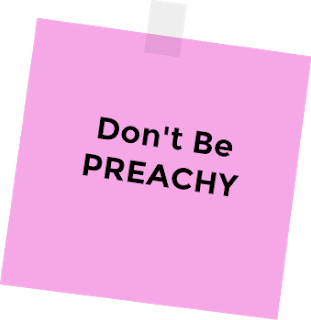
Dun-dun-dunnnnnnn. Preachy. The wince-inducing word no Christian Fiction author wants to hear/read in a review.
Novels sound preachy when the author tries to teach the READER a spiritual lesson. Stories where a character learns the truth about a lie they believed, or that enlarge their truth through understanding more fully a spiritual reality, are rarely labeled preachy, because the spiritual journey springs naturally out of the character and plot. There is no "Block of Great Truth Because The Reader Needs To Know It" passages in the book, just a gradual awakening of the characters to a truth.
Truth can be revealed a couple of different ways in your story. Through the plot--what the character experiences can teach them the truth or falsehood of what they believe. Or through a mentor/wise person who counsels and reveals truth to the character.
One word of warning though. When you set your characters on a spiritual journey, you will travel right along with them, learn and relearn what they do, and as a result, both broaden and deepen your understanding of a fundamental truth or two about God.
Consider some of the possible lies your character could believe, and how you could weave that lie into their back story and personality:
Lies that a character might believe about who God is
· Doubt His sovereignty
· Doubt His goodness
· Doubt that He is truly all-knowing
· Doubt His kindness
· Will He be merciful?
· Is God truly faithful?
· Is God Never-changing, or is He capricious?
· Does He hear their prayers?
· Does God keep his promises?
· Does God hold grudges/is vindictive?
· God only wants to punish people for doing bad things
· God is impossible to please
Lies that a character might believe about who they are
· Unworthy
· Unlovable
· That they must get themselves cleaned up in order to approach God
· That God needs their help
· Unable to trust
· Too smart to need God
· That God is just for Sunday- I don’t need Him every day
· That they are a failure/don’t measure up

These are just a sampling of possible lies for our characters to believe.
What others are out there? If you’re a reader, what spiritual journey lies have you read that resonate with you? If you’re a writer, what spiritual journey lies have you incorporated in your stories?
 Best-selling, award-winning author Erica Vetsch loves Jesus, history, romance, and sports. She’s a transplanted Kansan now living in Minnesota, and she is married to her total opposite and soul mate! When she’s not writing fiction, she’s planning her next trip to a history museum and cheering on her Kansas Jayhawks and New Zealand All Blacks. You can connect with her at her website, www.ericavetsch.com where you can read about her books and sign up for her newsletter, and you can find her online at https://www.facebook.com/EricaVetschAuthor/ where she spends way too much time!
Best-selling, award-winning author Erica Vetsch loves Jesus, history, romance, and sports. She’s a transplanted Kansan now living in Minnesota, and she is married to her total opposite and soul mate! When she’s not writing fiction, she’s planning her next trip to a history museum and cheering on her Kansas Jayhawks and New Zealand All Blacks. You can connect with her at her website, www.ericavetsch.com where you can read about her books and sign up for her newsletter, and you can find her online at https://www.facebook.com/EricaVetschAuthor/ where she spends way too much time!AVAILABLE NOW! Mail-Order Mishaps! Get your copy today!
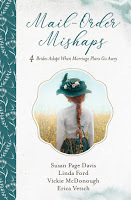
Dreams of Finding Mr. Right Go Wrong in the Old West
Erica's story in this collection:
The Galway GirlKansas, 1875
A mail-order mix-up sends Irish lass Maeve O’Reilly to the Swedish community of Lindsborg, Kansas. Will Kaspar Sandberg consider it a happy accident or a disaster to be rectified as soon as possible?
Published on June 23, 2019 21:00
June 21, 2019
Weekend Edition

If you are not familiar with our giveaway rules, take a minute to read them here. It keeps us all happy! All winners should send their name, address, and phone number to claim prizes. Note our new email address and please send your emails to Seekerville2@gmail.com

Monday: Jan Drexler ran us through a short course in writing Amish stories. The winner of the first book in Jan's series, "The Amish of Weaver's Creek" is Tammie Edington Shaw! We home you enjoy The Sound of Distant Thunder, Tammie!
Tuesday: Laurel Blount dropped by to talk about Our Hometown Hopes. And the winner of her latest release, Hometown Hope, is Lee-Ann!
Wednesday: Publishers Weekly Bestselling Author Debby Giusti shared "Five Writing Tips on Getting Into Character," along with photos of the movie studios near her home in Georgia. Debby held a drawing for digital copies of SUMMER OF SUSPENSE. The lucky winners are: Edwina, Susanne (smincer10@gmail.com), Kathryn Barker, Connie Porter Saunders and Glynis. Congrats!
Friday: Winnie Griggs discussed her take on how to prepare fro an editor/agent pitch appointment.

Monday: Erica Vetsch is posting about the spiritual journey of fictional characters. It's ALL LIES, I tell you!
Wednesday: Cate Nolan will be bringing us her first regular monthly blog post! Friday: Pam Hillman will be posting today!

Jan is super excited to be part of an Amish Christmas novella collection from Bethany House, An Amish Christmas Kitchen, with authors Leslie Gould and Kate Lloyd! This lovely book would make a great Christmas present - and you can pre-order now! The release date is only a couple months away - September 3rd!
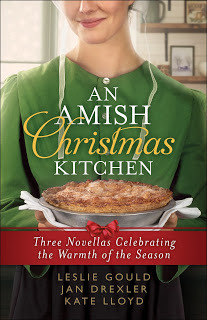
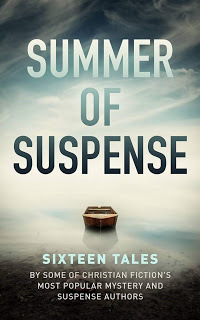
Long Days. Hot Nights. Deadly Secrets.Grab this red hot Christian Suspense Anthology bargain for just 99 cents for a short time only before the price increases to 9.99.Start your summer off right with 16 gripping and never-before published tales of Christian suspense from today's most popular mystery and suspense authors.Join Mary Alford, Christy Barritt, Patricia Bradley, Vannetta Chapman, Mary Ellis, Debby Giusti, Rachel J. Good, Ruth Hartzler, Shaen Layle, Ruth Logan Herne, Loree Lough, Elizabeth Ludwig, Nancy Mehl, Serena B. Miller, Samantha Price, Alana Terry on a dangerous journey filled with mystery, suspense, and faith that that will keep you on the edge of your seat until the very end.Pre-Order Summer of Suspense at Barnes & Noble, Apple, and Amazon.

How to Get Started with a WordPress Author Website by Rachel McCollin at The Creative Penn Blog
5 Ways to Avoid Plot Holes in Your Novel by Sin Ribbon at The Creative Penn
Focus Your Writer's Eye with these 7 Tips by Edie Melson at The Write Conversation
A Writers' Stages of Grief by Bob Hostetler at the Steve Laube Agency Blog
Why Authors Use Pseudonyms by Karen Van Den Huevel at Thyme For Writers
The Craft of the Short Story by Anthea Lawson Sharp at Writers In The Storm
Writer's Block is a Gift. Here's Why. by Julia Roberts at Jane Friedman
5 Ways To Earn Your Audience's Loyalty by KM Weiland at Helping Writers Become Authors
Published on June 21, 2019 21:00
June 20, 2019
Honing Your Pitch
Hello everyone, Winnie Griggs here. I'm just back from my vacation trip with my 3 sisters and had a fabulous time. It was such fun to spend time with my sisters - we talked a lot, reminisced a lot and laughed a lot. Oh, and I managed to get 'rescued" by a group of very nice (and cute!) fireman - that may be going into a book some day :)
But on to the actual post for today. We're moving into conference season so I thought it might be time to have a refresher on pitching to an agent or editor. So here are a few notes taken from a workshop I give on the subject.

Pitching to an agent or editor has never been one of my favorite things to do. Trying to summarize my masterpiece into a few sentences for this person who has the power to further (or not) my career is somewhat intimidating.
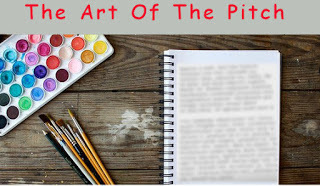
The good news is that there is an art to the pitch, and anyone can master it. While this doesn’t make it any more ‘fun’, feeling prepared does give one the confidence boost to get through the session with some measure of aplomb.
Once you’ve crafted your pitch (don’t worry, we’ll get to the how’s of that in a minute) - PRACTICE. And this means saying it OUT LOUD, over and over, until it comes naturally.
 Grab anyone who will sit still long enough to listen, and pitch to them as if they were an agent or editor. If you can’t find a willing vict-, uhm, volunteer, practice in front of a mirror. Make sure the words flow naturally, that you aren't rushing it (my own biggest problem), and that the words you’ve chosen present your work in an active and interesting light.
Grab anyone who will sit still long enough to listen, and pitch to them as if they were an agent or editor. If you can’t find a willing vict-, uhm, volunteer, practice in front of a mirror. Make sure the words flow naturally, that you aren't rushing it (my own biggest problem), and that the words you’ve chosen present your work in an active and interesting light.
If you want to write down your pitch, or just memory-jogging bullet points, use 3x5 index cards and bring them along.
Ok, the big day arrives, and the moderator signals it’s your turn. What do you do?

· Take a deep breath and try to relax.· Smile, introduce yourself, shake her/his hand.· Once introductions are out of the way, give your pitch.· Let your enthusiasm and excitement for your work show through - it’ll be contagious!· After you’ve delivered the opening pitch, sit back and give the editor/agent an opportunity to comment. This is VERY important. You need to get feedback on what you’ve presented so far, and you want to let the agent/editor ask questions. Be prepared to provide information on:° additional details about the book you just pitched° details about yourself and your writing credits - this is a good time to mention contest wins, group affiliations, other writing credits, etc.° high concept information on any other works you have in progress or planned.· When time is up, shake hands, thank her for her time and consideration, and leave promptly. DO NOT OVERSTAY YOUR WELCOME.
Now, on to crafting the pitch itself. There are lots of different schools of thought on this. What I’m going to give you here is my own slant, based on information I’ve garnered from other workshops, how-to articles, and (sometimes painful) personal experience.
First, I’ll give you the checklist and then we’ll go into more detail and look at an example (NOTE: this is for a romance. Tailor it as necessary for other genres)

The pitch should include:· genre/sub-genre and, if appropriate, targeted line· approximate word count· setting· high concept or trope· Heroine: who she is, what she wants, what stands in her way· Hero: who he is, what he wants, what stands in his way· Romantic conflict: what attracts them to each other/keeps them physically together, what keeps them from committing/holds them emotionally apart.
Be concise - you should be able to pack all this info into 6-9 well crafted sentences.
The first part should be easy. Simply open with something along the lines of:THE LADY AND THE TIGER is a single title Regency-era historical of approx 95,000 words.
Now, what do I mean by High Concept or Trope? Well, there are two ways to approach this. You can use one of the well-known tropes such as:· Marriage of Convenience · Secret Baby· Beauty and the Beast· Poor Little Rich GirlBy the way, your story may contain elements of more than one of these. When pitching, however, I would stick to the one or two main themes.
The second technique is that of comparing your story to well-known characters, stories or movies. This would look something like:· Elle Woods meets Mr. Spock· Sherlock Holmes meets Buffy the Vampire Slayer· Pride and Prejudice in Outer Space
Either approach gives the agent/editor an immediate image of what kind of story you will be pitching.
Next we define the heroine: who she is, what she wants and what stands in her way.Part 1: Who she is. By this, I don’t mean her name. Instead, paint a picture: a single mother of tripletsthe only female in a prestigious law firman ugly duckling who inherits a modeling agencyDon’t you immediately get a sense for what each of these women might be like?
Part 2: What she wants. This is the goal she is working toward and your description should hint at why.
Part 3: What stands in her way. This is, of course, the obstacle (internal or external) that keeps her from achieving her goal.
Once you’ve completed the above process for the heroine, do the same for the hero.
Now for the Romantic Conflict.
Part 1 - What attracts them to each other/keeps them together physically.Even though they may not be initially attracted to one another, you must give them a reason to stay in close proximity for an extended period of time, allowing the attraction to develop. Examples of this would be:· their work/social circumstances throw them together often· they both seek the same prize/item and must work together to acquire it· they are stranded together
Part 2 - What keeps them from committing/holds them emotionally apart. This explains why, once the attraction builds, they cannot achieve their happily ever after, at least not without significant cost.
Ok, so lets see an example of how this would work. Here’s one based on one of my own books.
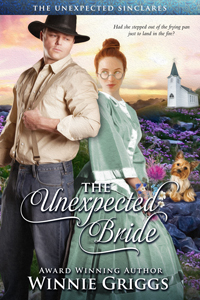 THE UNEXPECTED BRIDE is a single title Americana of approx 92,000 words. It’s a Poor Little Rich Girl/Marriage of Convenience story set in 1892 NE Texas.The heroine, a hopelessly inept, bookish heiress, sets out to prove she can make it on her own by taking a job as a governess, only to find she’s botched things yet again when she finds her new ‘boss’ thinks she’s come west to be his mail order bride.The hero, a lone wolf who thinks himself unlovable, is dead set on adopting his recently orphaned nieces and nephews so the children can stay together as a family, even if it means he has to marry a snooty debutante who doesn’t want him.The two strike an uneasy bargain to marry - agreeing to stay wed only long enough to finalize his adoption of the children. Their plan is to get an annulment afterwards, allowing her to quietly return to her home ‘back east’. This means, of course, they must treat the marriage as a purely platonic business arrangement. Things get complicated in a hurry, however, as the attraction sizzles between them and threatens all their well-laid plans.
THE UNEXPECTED BRIDE is a single title Americana of approx 92,000 words. It’s a Poor Little Rich Girl/Marriage of Convenience story set in 1892 NE Texas.The heroine, a hopelessly inept, bookish heiress, sets out to prove she can make it on her own by taking a job as a governess, only to find she’s botched things yet again when she finds her new ‘boss’ thinks she’s come west to be his mail order bride.The hero, a lone wolf who thinks himself unlovable, is dead set on adopting his recently orphaned nieces and nephews so the children can stay together as a family, even if it means he has to marry a snooty debutante who doesn’t want him.The two strike an uneasy bargain to marry - agreeing to stay wed only long enough to finalize his adoption of the children. Their plan is to get an annulment afterwards, allowing her to quietly return to her home ‘back east’. This means, of course, they must treat the marriage as a purely platonic business arrangement. Things get complicated in a hurry, however, as the attraction sizzles between them and threatens all their well-laid plans.
This pitch managed to cover every one of our bullet points in just 8 sentences - and hopefully grabbed your interest and made you want to learn more in the process. And yes, I know it's a bit formal in tone - feel free to use whatever degree of formality/informality you are comfortable with.
As you can see, preparation is the key. It's important to understand that this is not just make-work - it is your chance to sell yourself as a professional writer, and to sell your work as a marketable gem.
One last word of caution - don’t expect to actually strike a deal at the pitch session, no matter how good a job you do. A conference appointment is just an opportunity to connect, an in-person query if you will. But it could be the door that opens onto something absolutely wonderful.
So prepare, practice, and when the time comes, you’ll be ready to wow ‘em!
Now it's your turn. What do you think - did this resonate with you? Do you have a checklist of your own that you use when pitching? How is it different or the same as this one?
But on to the actual post for today. We're moving into conference season so I thought it might be time to have a refresher on pitching to an agent or editor. So here are a few notes taken from a workshop I give on the subject.

Pitching to an agent or editor has never been one of my favorite things to do. Trying to summarize my masterpiece into a few sentences for this person who has the power to further (or not) my career is somewhat intimidating.

The good news is that there is an art to the pitch, and anyone can master it. While this doesn’t make it any more ‘fun’, feeling prepared does give one the confidence boost to get through the session with some measure of aplomb.
Once you’ve crafted your pitch (don’t worry, we’ll get to the how’s of that in a minute) - PRACTICE. And this means saying it OUT LOUD, over and over, until it comes naturally.
 Grab anyone who will sit still long enough to listen, and pitch to them as if they were an agent or editor. If you can’t find a willing vict-, uhm, volunteer, practice in front of a mirror. Make sure the words flow naturally, that you aren't rushing it (my own biggest problem), and that the words you’ve chosen present your work in an active and interesting light.
Grab anyone who will sit still long enough to listen, and pitch to them as if they were an agent or editor. If you can’t find a willing vict-, uhm, volunteer, practice in front of a mirror. Make sure the words flow naturally, that you aren't rushing it (my own biggest problem), and that the words you’ve chosen present your work in an active and interesting light.If you want to write down your pitch, or just memory-jogging bullet points, use 3x5 index cards and bring them along.
Ok, the big day arrives, and the moderator signals it’s your turn. What do you do?

· Take a deep breath and try to relax.· Smile, introduce yourself, shake her/his hand.· Once introductions are out of the way, give your pitch.· Let your enthusiasm and excitement for your work show through - it’ll be contagious!· After you’ve delivered the opening pitch, sit back and give the editor/agent an opportunity to comment. This is VERY important. You need to get feedback on what you’ve presented so far, and you want to let the agent/editor ask questions. Be prepared to provide information on:° additional details about the book you just pitched° details about yourself and your writing credits - this is a good time to mention contest wins, group affiliations, other writing credits, etc.° high concept information on any other works you have in progress or planned.· When time is up, shake hands, thank her for her time and consideration, and leave promptly. DO NOT OVERSTAY YOUR WELCOME.
Now, on to crafting the pitch itself. There are lots of different schools of thought on this. What I’m going to give you here is my own slant, based on information I’ve garnered from other workshops, how-to articles, and (sometimes painful) personal experience.
First, I’ll give you the checklist and then we’ll go into more detail and look at an example (NOTE: this is for a romance. Tailor it as necessary for other genres)

The pitch should include:· genre/sub-genre and, if appropriate, targeted line· approximate word count· setting· high concept or trope· Heroine: who she is, what she wants, what stands in her way· Hero: who he is, what he wants, what stands in his way· Romantic conflict: what attracts them to each other/keeps them physically together, what keeps them from committing/holds them emotionally apart.
Be concise - you should be able to pack all this info into 6-9 well crafted sentences.
The first part should be easy. Simply open with something along the lines of:THE LADY AND THE TIGER is a single title Regency-era historical of approx 95,000 words.
Now, what do I mean by High Concept or Trope? Well, there are two ways to approach this. You can use one of the well-known tropes such as:· Marriage of Convenience · Secret Baby· Beauty and the Beast· Poor Little Rich GirlBy the way, your story may contain elements of more than one of these. When pitching, however, I would stick to the one or two main themes.
The second technique is that of comparing your story to well-known characters, stories or movies. This would look something like:· Elle Woods meets Mr. Spock· Sherlock Holmes meets Buffy the Vampire Slayer· Pride and Prejudice in Outer Space
Either approach gives the agent/editor an immediate image of what kind of story you will be pitching.
Next we define the heroine: who she is, what she wants and what stands in her way.Part 1: Who she is. By this, I don’t mean her name. Instead, paint a picture: a single mother of tripletsthe only female in a prestigious law firman ugly duckling who inherits a modeling agencyDon’t you immediately get a sense for what each of these women might be like?
Part 2: What she wants. This is the goal she is working toward and your description should hint at why.
Part 3: What stands in her way. This is, of course, the obstacle (internal or external) that keeps her from achieving her goal.
Once you’ve completed the above process for the heroine, do the same for the hero.
Now for the Romantic Conflict.
Part 1 - What attracts them to each other/keeps them together physically.Even though they may not be initially attracted to one another, you must give them a reason to stay in close proximity for an extended period of time, allowing the attraction to develop. Examples of this would be:· their work/social circumstances throw them together often· they both seek the same prize/item and must work together to acquire it· they are stranded together
Part 2 - What keeps them from committing/holds them emotionally apart. This explains why, once the attraction builds, they cannot achieve their happily ever after, at least not without significant cost.
Ok, so lets see an example of how this would work. Here’s one based on one of my own books.
 THE UNEXPECTED BRIDE is a single title Americana of approx 92,000 words. It’s a Poor Little Rich Girl/Marriage of Convenience story set in 1892 NE Texas.The heroine, a hopelessly inept, bookish heiress, sets out to prove she can make it on her own by taking a job as a governess, only to find she’s botched things yet again when she finds her new ‘boss’ thinks she’s come west to be his mail order bride.The hero, a lone wolf who thinks himself unlovable, is dead set on adopting his recently orphaned nieces and nephews so the children can stay together as a family, even if it means he has to marry a snooty debutante who doesn’t want him.The two strike an uneasy bargain to marry - agreeing to stay wed only long enough to finalize his adoption of the children. Their plan is to get an annulment afterwards, allowing her to quietly return to her home ‘back east’. This means, of course, they must treat the marriage as a purely platonic business arrangement. Things get complicated in a hurry, however, as the attraction sizzles between them and threatens all their well-laid plans.
THE UNEXPECTED BRIDE is a single title Americana of approx 92,000 words. It’s a Poor Little Rich Girl/Marriage of Convenience story set in 1892 NE Texas.The heroine, a hopelessly inept, bookish heiress, sets out to prove she can make it on her own by taking a job as a governess, only to find she’s botched things yet again when she finds her new ‘boss’ thinks she’s come west to be his mail order bride.The hero, a lone wolf who thinks himself unlovable, is dead set on adopting his recently orphaned nieces and nephews so the children can stay together as a family, even if it means he has to marry a snooty debutante who doesn’t want him.The two strike an uneasy bargain to marry - agreeing to stay wed only long enough to finalize his adoption of the children. Their plan is to get an annulment afterwards, allowing her to quietly return to her home ‘back east’. This means, of course, they must treat the marriage as a purely platonic business arrangement. Things get complicated in a hurry, however, as the attraction sizzles between them and threatens all their well-laid plans. This pitch managed to cover every one of our bullet points in just 8 sentences - and hopefully grabbed your interest and made you want to learn more in the process. And yes, I know it's a bit formal in tone - feel free to use whatever degree of formality/informality you are comfortable with.
As you can see, preparation is the key. It's important to understand that this is not just make-work - it is your chance to sell yourself as a professional writer, and to sell your work as a marketable gem.
One last word of caution - don’t expect to actually strike a deal at the pitch session, no matter how good a job you do. A conference appointment is just an opportunity to connect, an in-person query if you will. But it could be the door that opens onto something absolutely wonderful.
So prepare, practice, and when the time comes, you’ll be ready to wow ‘em!
Now it's your turn. What do you think - did this resonate with you? Do you have a checklist of your own that you use when pitching? How is it different or the same as this one?
Published on June 20, 2019 22:15
June 18, 2019
Five Writing Tips for Getting Into Character
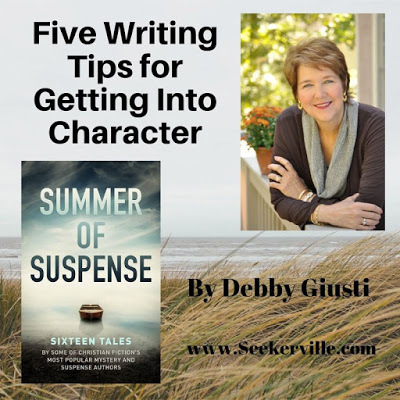
If you watch the news, you’ve probably seen stories recently about Georgia’s film industry. Movie and television studios abound in the Peach State. Four studios are located within ten miles of my house.
 Riverwood Studio, in Senoia, GA, was the first film studio in my area.
Riverwood Studio, in Senoia, GA, was the first film studio in my area.I toured the studio in 2009. “The Walking Dead” is filmed in Senoia, a small town seven miles south of me. Buses haul in tourists from Atlanta every weekend to visit the various film lots, sip lattes at the Woodbury Shoppe featured in the series, and scour the streets hoping to spot a zombie or two.
The TV show, “Drop Dead Divas,” was filmed there as well as numerous movies, including “Footloose,” “Pet Sematary II,” “Fried Green Tomatoes,” and “Stand Your Ground.”
 Pinewood Atlanta Studio owns 700-acres of land
Pinewood Atlanta Studio owns 700-acres of landin my area of Georgia.Pinewood Atlanta Studios is less than five miles away. Chick-fil-A CEO Dan Cathy, son of Chick-fil-A founder Truitt Cathy, helped attract the British-based studio to Fayette County where I live. Pinewood has 18 sound studios located on their sprawling 700-acre campus. “Avengers: Endgame,” “Spider-Man: Homecoming,” “Black Panther,” “Captain America: Civil War” and “Ant-Man” are some of their credits.
 I pulled into Pinewood Studio's entrance drive and
I pulled into Pinewood Studio's entrance drive andwas stopped by security. No photos allowed beyond
the road...so I went across the street and snapped
this shot.In addition to the studio, Pinewood Forest is being built nearby. The quaint village features innovated upscale homes, shops and eateries and is touted as a mecca for actors, artists, and writers.
 The new Pinewood Forest Village across from the studio is attracting
The new Pinewood Forest Village across from the studio is attractingactors, artists and writers. A scene from one of the Pinewood Studios Marvel movies was shot on the lake behind my house. Some years ago in a blog post, I shared my adventures when I crawled through the underbrush to spy on the filming and got too close to the action. One of the directors eventually called out to me. “Lady, we can see you. Please move away from the water.”
 The docks on the lake behind my house. The film crew is
The docks on the lake behind my house. The film crew isgetting ready to shoot their water scene.Georgia is known as the Hollywood of the South so when I brainstormed ideas for this post, I thought about actors and how they get into character. Google provided interesting information about stars who travel to exotic destinations to better understand their character’s backstory. Some actors live blindfolded for a period of time to better portray those who are vision impaired. One actor was present during a heart transplant to prepare for his role as a TV cardiologist. Another actor traveled to Rwanda to learn more about gorillas before he played King Kong.
 Five large stadium lights were placed around the
Five large stadium lights were placed around thelake for the middle-of-the-night filming. The first
set of lights is on in this photo.
The lights were so bright they turned
the night into day.Actors need to get into character, and writers need to as well. I currently write Amish suspense and am amazed how easily I can mentally enter into that Amish way of life. As I write my stories, I slip into plain mode. I see myself in the Amish farmhouse, preparing meals on the wood burning cook stove and pumping water at the well. Each morning, I vicariously rise before dawn, pin my calf-length dress, settle my starched kappover my bun, and hurry downstairs to start coffee perking in an aluminum drip pot. When I go to town, I ride in a buggy and wave to other Amish folks as they pass by in their rigs, all the while enjoying the fresh country air and the rhythmic clip-clop of the horse’s hooves on the pavement.
 Some of Pinewood Studios' 18 sound stages.
Some of Pinewood Studios' 18 sound stages.As writers, we’re told to write what we know. I took that advice to heart after I sold my first book to Love Inspired Suspense. I’m a medical technologist by profession and worked in the clinical laboratory. Writing my Magnolia Medical series required research on the emerging diseases I featured in the various stories, but getting into character was easy since I knew the lab environment and what makes scientists tick.
 A daytime dress rehearsal. I was up at 1 AM to watch
A daytime dress rehearsal. I was up at 1 AM to watchthe filming of this scene as the two stunt men
were hoisted out of a boat and into a chopper.My dad and husband were career army and my son is retired army. I lived the army way for years so writing my Military Investigations series that features special agents in the Army’s Criminal Investigation Division was a natural fit. I did extensive research to make certain I got the CID details right, but just as with my other series, once I had the first story under my belt, I slipped easily into character because I was comfortable in the setting and understood my military heroes and heroines.

Want some advice? Here are my Five Writing Tips for Getting into Character:
Research! Know the setting and learn as much as possible about your character’s profession, way of life, education, and background. Some writers fill out character charts that include favorite color, favorite food, best friend, pets, and other bits of trivia that can help you better know your characters. A few of those small details sprinkled into the story can add depth and realism. In person visits to the location or the unique environment where a story takes place adds authenticity as well.
Name that character. In my opinion, names are important. I struggled getting into one of my characters who remained aloof. After writing more than half the book, I realized his name was the problem. Once I changed his name, the character came alive on the page.
Short Reflections in the Character’s POV.For particularly difficult characters, I suggest writing a first person stream of consciousness essay or reflection about the character’s backstory or some aspect of his life with which he struggles. Usually the character starts revealing himself when you take the time to hear what he has to say.
Keep Writing!Don’t give up. Some characters are reclusive and unwilling to reveal their flaws or fears in the first fifty pages or so. Keep writing and eventually her true nature will emerge. Then go back and revise the beginning of the story in light of the person you now know her to be.
Check the GMC!When having problems with a character, check his or her goals, motivation and conflict. Especially important is the internal conflict or the wound in her past that causes her to mask her true feelings and keeps her from living life to the full. Once you identify that internal wound, you can better understand your character and your story. In fact whenever my story isn’t coming together, I always review my GMC and especially the internal conflict. Often a slight tweak can bring the story into better alignment.

How do you get into character? Leave a comment to be entered into a drawing for Summer of Suspense. I’ll pick five winners. Let me know if you wish to be included in the drawing.
Happy Writing!
Wishing you abundant blessings!
Debby Giustiwww.DebbyGiusti.com
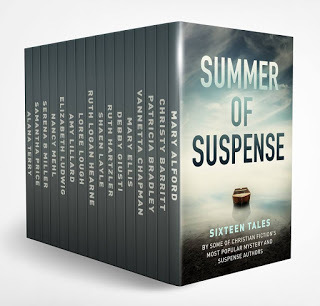
Long Days. Hot Nights. Deadly Secrets.Grab this red hot Christian Suspense Anthology bargain! Just $.99 for a short time only before the price increases to $9.99.Start your summer off right with 16 gripping and never before published tales of suspense from today's most popular Christian mystery and suspense authors.Join Mary Alford, Christy Barritt, Patricia Bradley, Vannetta Chapman, Mary Ellis, Debby Giusti, Rachel J. Good, Ruth Hartzler, Shaen Layle, Ruth Logan Herne, Loree Lough, Elizabeth Ludwig, Nancy Mehl, Serena B. Miller, Samantha Price, Alana Terry on a dangerous journey filled with mystery, suspense, and faith that that will keep you on the edge of your seat until the very end.Pre-Order Summer of Suspense at Barnes & Noble, Apple, and Amazon.
Published on June 18, 2019 21:00
June 17, 2019
Our Hometown Hopes
by Laurel Blount
Mindy here, and I am so pleased to have my friend and fellow Love Inspired author, Laurel Blount with us today. I am such a fan her books, so I hope you all will give her a warm Seekerville welcome.
 My own hometown! Photo by King DavisI’m what my grandma used to call a “homebody.” I still live ten minutes away from the hospital where I was born. In this age of convenient travel, that’s a little unusual--in the past, not so much. I’ve read that not too long ago most folks rarely traveled farther than thirty miles from their birthplace. And I’ve heard the Amish don’t embrace cars because they don’t want their communities becoming too mobile. They feel easy mobility tears the fabric of family and friendships.
My own hometown! Photo by King DavisI’m what my grandma used to call a “homebody.” I still live ten minutes away from the hospital where I was born. In this age of convenient travel, that’s a little unusual--in the past, not so much. I’ve read that not too long ago most folks rarely traveled farther than thirty miles from their birthplace. And I’ve heard the Amish don’t embrace cars because they don’t want their communities becoming too mobile. They feel easy mobility tears the fabric of family and friendships.Okay, so most of us aren’t too eager to surrender our car keys, but I do sense a growing hunger for old-fashioned hometowns. A common remark I hear about my Pine Valley, Georgia books for Love Inspired is “I wish I could move to that place!” I’ve heard readers say similar things about the towns in other series--such as Mindy Obenhaus’s books set in Ouray, Colorado. And recently the Love Inspired editors reminded their authors that they’d like to see even more small-town settings.
I’m wrapping up final edits for my last book to be set in Pine Valley, Georgia--so I’ll be looking for a new “hometown” for future stories. With that in mind, I’ve done some informal polls to discover what hometown really means to my readers. The folks I talked to came from all sorts of places, but I discovered some interesting common factors that I’ll be keeping in mind as I craft my next series.
A hometown feels like family . I heard over and over that home is wherever family is. Maybe that’s why Love Inspired is encouraging authors to connect series books through family relationships rather than only geographical settings. Sure, they can drive us a little batty sometimes, but strong family ties make us feel at home!
A hometown feels familiar. People spoke fondly of long-standing traditions in their hometowns, of special landmarks and beauty spots, and of historical events that had occurred nearby. Memories are wound about these beloved places, giving them a unique sparkle for the folks who call them home. Every person was convinced that their own hometown was the very best place to live!
 A hometown feels friendly.
Readers praised towns that rally together to help each other during difficult times. They talked not only about personal friendships, but also about a wider sense of fellowship with their neighbors. These relationships transform a town from a place you live to a place you belong. That sense of shared community is something people really yearn for!
A hometown feels friendly.
Readers praised towns that rally together to help each other during difficult times. They talked not only about personal friendships, but also about a wider sense of fellowship with their neighbors. These relationships transform a town from a place you live to a place you belong. That sense of shared community is something people really yearn for!Thanks to amazing technology, our mobile world seems--in some ways--more connected than ever. But people still long for those old-fashioned, hometown connections --and they’d enjoy spending a few hours visiting characters in a place that feels comfortable to them. Now that I know the kind of place they’re looking for, it’ll be that much easier to use my story settings to welcome them home!
My third Love Inspired HOMETOWN HOPE releases today! My book baby and I share a birthday--how sweet is that?! And what’s a birthday without a gift? Today I’m giving away a copy of HOMETOWN HOPE . To be entered in a random drawing, just leave a comment!
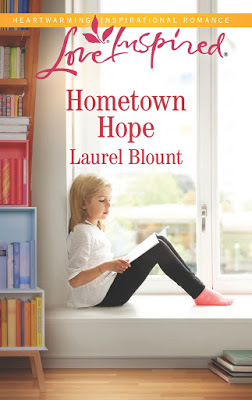 Available now!
Available now!
He’ll do anything for his daughter…
Even fight to regain an old classmate’s broken trust.
In the three years since her mother’s death, widower Hoyt Bradley’s daughter, Jess, hasn’t spoken—until she suddenly begs him to save her favorite bookstore from closing. Hoyt is desperate to hear his daughter’s voice again, but he and the bookstore’s pretty owner, Anna Delaney, share a less-than-friendly past. Working together is complicated enough…but can they avoid falling in love?
 Laurel Blount lives on a small farm in middle Georgia with her husband, their four children, and an assortment of very spoiled animals. She divides her time between farm chores, homeschooling, and writing. She's busy, but at least she's never bored! Whenever she's not working, you can find Laurel with a cup of tea at her elbow, a cat in her lap, and a good book in her hand. Stay in touch by signing up for her monthly newsletter at www.laurelblountbooks.com.
Laurel Blount lives on a small farm in middle Georgia with her husband, their four children, and an assortment of very spoiled animals. She divides her time between farm chores, homeschooling, and writing. She's busy, but at least she's never bored! Whenever she's not working, you can find Laurel with a cup of tea at her elbow, a cat in her lap, and a good book in her hand. Stay in touch by signing up for her monthly newsletter at www.laurelblountbooks.com.
Published on June 17, 2019 21:00



